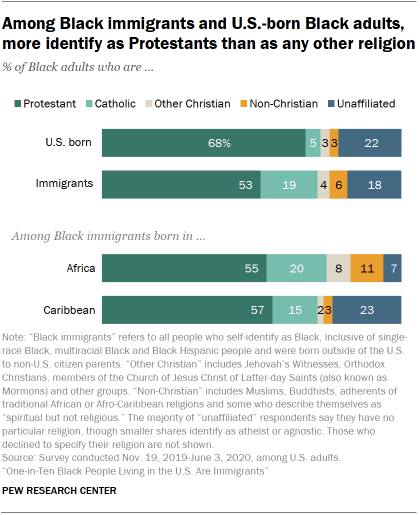Although the Census Bureau provides some types of demographic data, it does not collect information on religious identification. However, a Pew Research Center survey of Black adults in the U.S. conducted in 2019-2020 offers some insight into this population’s religious identities.
While Black adults who are either U.S. born or U.S. immigrants are more likely to identify as Protestant than any other religion, a larger share of the U.S.-born Black population identifies as Protestant. About seven-in-ten Black U.S.-born adults are Protestant (68%), while 53% of the Black immigrant population has this religious affiliation.
A larger share of Black immigrant adults are Catholic than their U.S.-born Black counterparts (19% vs. 5%), and a slightly smaller share are unaffiliated with any religion (18% vs. 22%).
However, religiosity and religious composition vary by origin group among the Black U.S. immigrant population. While many African- and Caribbean-born Black immigrants identify as Protestant (55% and 57%, respectively), Caribbean-born Black immigrants are more likely to be unaffiliated than African-born immigrants (23% vs. 7%).
A similar pattern emerges when it comes to the importance of religion. Large shares of both U.S.-born and immigrant Black adults say that religion is very important to them (59% and 61%, respectively), but there are some differences among African- and Caribbean-born Black adults. While about six-in-ten Caribbean-born Black adults (59%) say religion is very important to them, seven-in-ten (72%) of those born in Africa say the same. African-born Black adults are also significantly more likely than those who are Caribbean born to say that people of faith have a religious duty to try to convert nonbelievers (68% vs. 55%, respectively).
There are less pronounced differences when it comes to whether belief in God is necessary to be moral and have good values. Somewhat similar shares of both U.S.-born and immigrant Black adults say belief in God is necessary to be moral and have good values (54% and 57%, respectively). And over half of both Caribbean-born and African-born adults say it is necessary to believe in God to have good values (59% and 61%).





